Supporting Uganda’s increasing production goals through nursery and seed lot development
World Coffee Research works alongside local partners to generate nursery training materials, host workshops for nursery operators, clean seed lots, and distribute seedlings across growing regions in Uganda
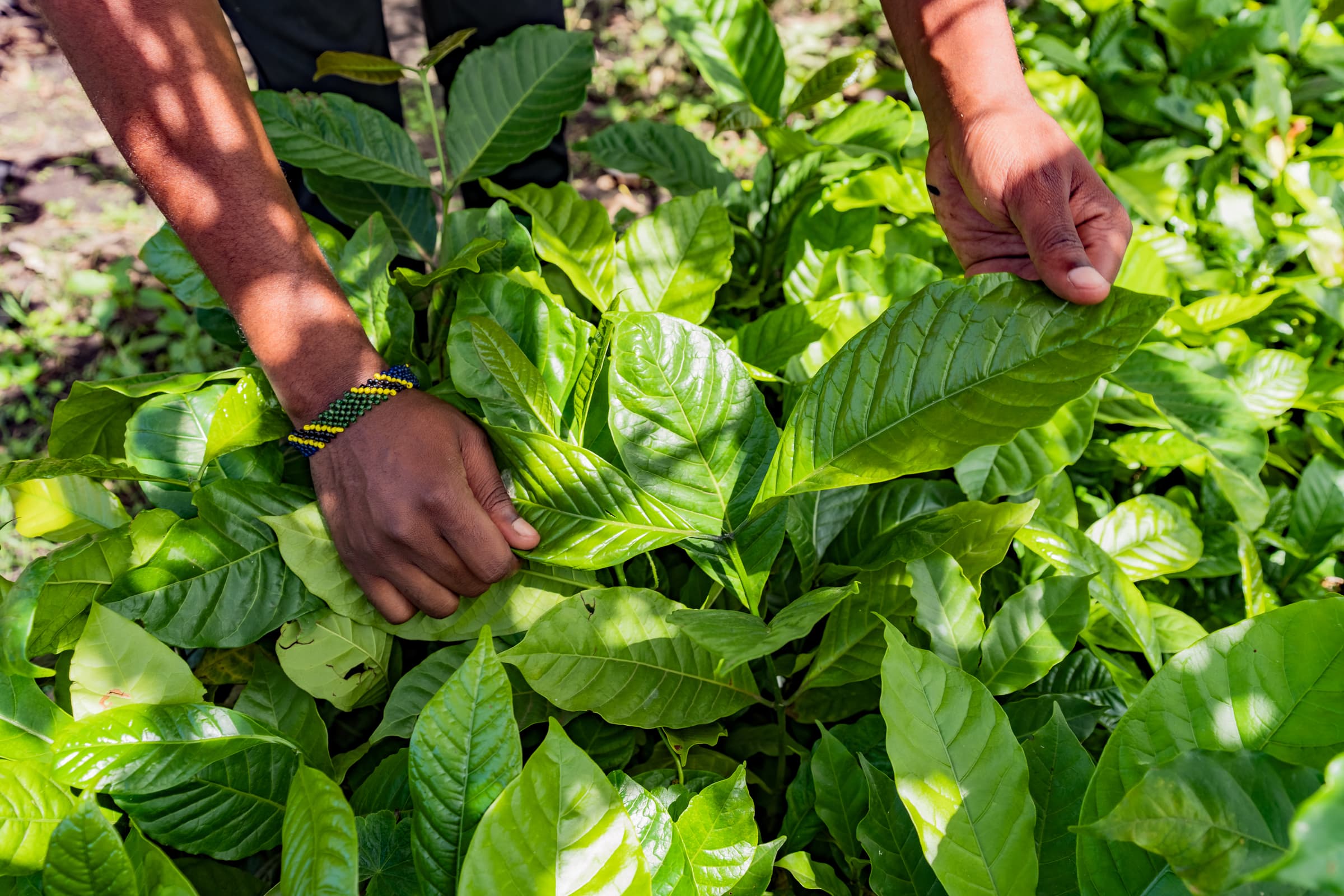
Nursery in the Kabarole district, Rwenzori region, Uganda.
Over the past year, World Coffee Research (WCR), together with the Uganda Coffee Development Authority (UCDA) and the Uganda National Coffee Research Institute (NaCORI), collaborated to strengthen the Ugandan nursery and seed sector to support the country’s expressed goal of quadrupling coffee production to 20 million bags between 2017 and 2030. The ongoing, multi-pronged collaboration to increase access to high-quality C. arabica and C. robusta seedlings has included various activities such as the publication of open-access, localized training materials, training of extension officers and nursery operators, evaluation and cleanup of seed lots, distribution of seedlings from certified nurseries via UGACOF/Sucafina, and more.
According to Robert Adomati, UGACOF Field Officer, “Supplying quality planting materials to farmers through our project partnership with World Coffee Research will have a significant impact—increasing productivity, easing the accessibility of high-yielding varieties, and improving farmer incomes.”
These activities directly support Uganda’s objective of transforming its coffee sector to benefit the ~1.5 million households that depend on sustainable coffee farming for their livelihoods. Enhancing access to quality planting material is one of nine key initiatives outlined in the country’s ambitious Coffee Roadmap, which aims to increase yields by 3-4 times compared to 2019-21 productivity rates and expand production land by 20%.
New tools, training, and propagation techniques optimize robusta seedling production and nursery establishment
Uganda is one of the foremost producers and exporters of robusta coffee worldwide, but like many coffee-producing countries, it faces challenges in the mass propagation of improved planting material and the distribution of seedlings to farmers. WCR partnered with UCDA to increase the ability of local nurseries to supply improved varieties—10 Coffee Wilt Disease (CWD)-resistant clonal lines, which have been commercially released under the name NARO Kituza Robusta (KR) 1-10—across the nation. This initiative was funded by Strauss Coffee B.V. and WCR member companies worldwide.
The project’s goal is to move 100,000 healthy KR plants into farmers’ hands, while also supporting an increased future supply of high-quality planting material by empowering nursery operators with the knowledge of how to propagate healthy, disease-resistant seedlings. To date, in partnership with UGACOF/Sucafina, nearly 50,000 KR plants have been supplied to entrepreneurial farmers in the Greater Masaka region, one of the top robusta-producing areas nationwide. These farmers are using these plants to establish micro nurseries on their land and have been equipped with information on how to effectively manage these varieties in both nursery and field environments, all with the intention of supporting a network of over 2,000 other farmers in Uganda in accessing these materials.
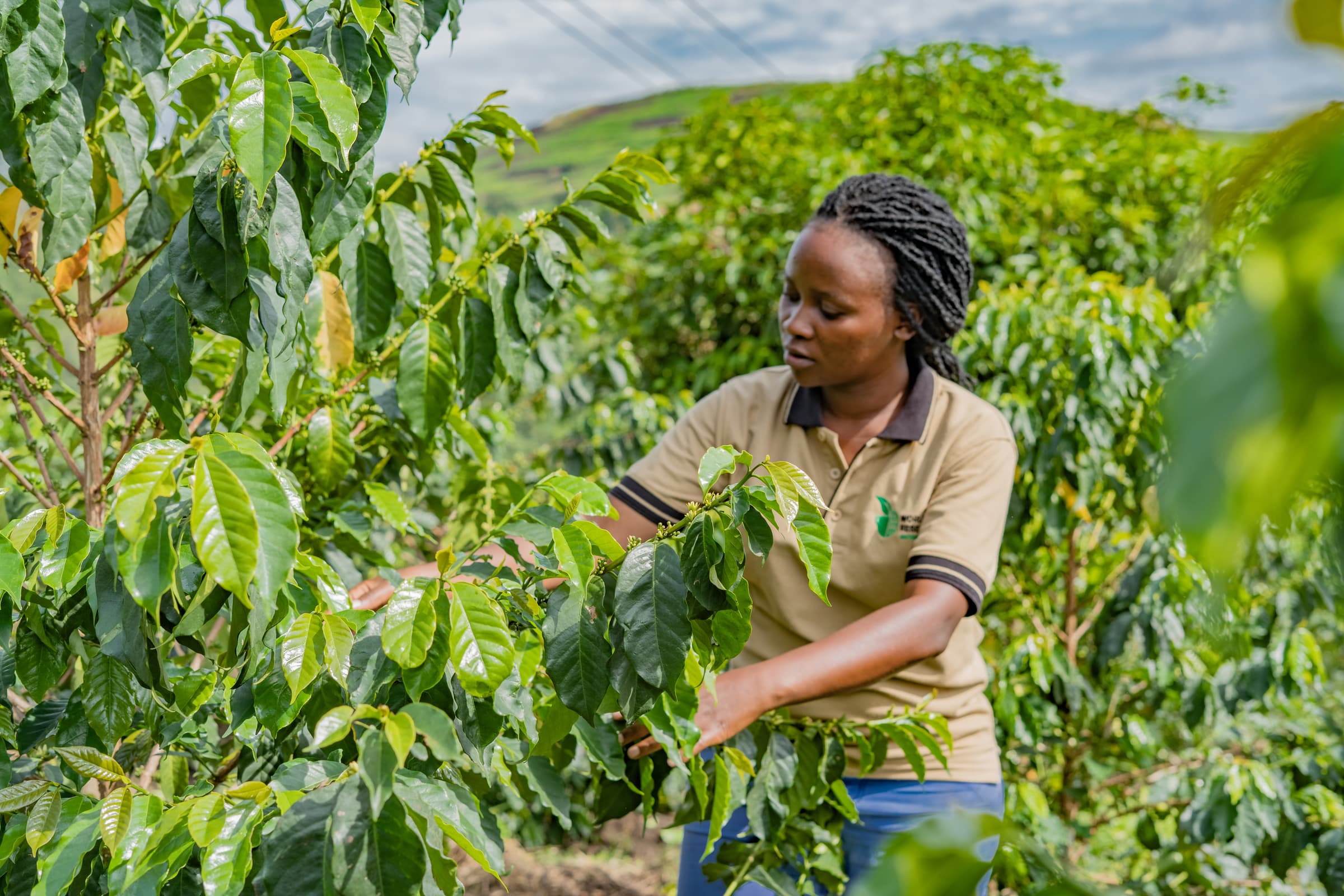
Maureen Namugalu, World Coffee Research's Project Manager for Uganda, inspects a coffee plant. Kabarole district, Rwenzori region, Uganda.
“I am proud that our partnership with WCR so quickly resulted in 10 profitable and soon self-sustaining nurseries, which are passionately managed by coffee farmers themselves,” said Sjaak De Bloois, Head of Sustainability & Agronomy for UGACOF. The remaining 50,000 plants will be supplied to the farmers in 2024, who will also receive support to achieve certification from UCDA, which serves as the local regulatory agency for clonal mother gardens in Uganda.
In addition, WCR, UCDA, and NaCORI are working together to optimize the country’s ability to propagate and successfully grow robusta varieties. At the request of UCDA, WCR conducted a five-day training in Masaka to instruct 393 nursery operators, who, together are responsible for producing more than 2 million plants annually, on best agricultural practices to optimize robusta nursery establishment and management. WCR also conducted a subsequent two-day training of 77 UCDA extension officers on grafting—a practice commonly used to reproduce other crops clonally but not typically coffee in Uganda—to make the continuous reproduction of material easier and more efficient.
These training sessions were supported by open-access educational resources produced and released by WCR specifically for Ugandan farmers and nursery operators, including a five-part video series on robusta clonal coffee nursery management and an instructional manual for successful vegetative propagation of CWD-resistant, drought-tolerant plants. These resources are also being released widely through a partnership with the Uganda Coffee Platform.
“The nursery training has contributed significantly to improving the skills of operators in the Masaka region, hence improving the quality of planting material being multiplied and sold to farmers,” said Dr. Gerald Kyalo, Director of Agricultural Development Services for UCDA, “Similarly, the [UCDA] field staff were very excited to participate in the training about grafting technologies, which will be useful in rehabilitation and renovation of coffee gardens, and can also be applied in variety replacement. Our officers will apply this knowledge in the field to improve production and productivity.”
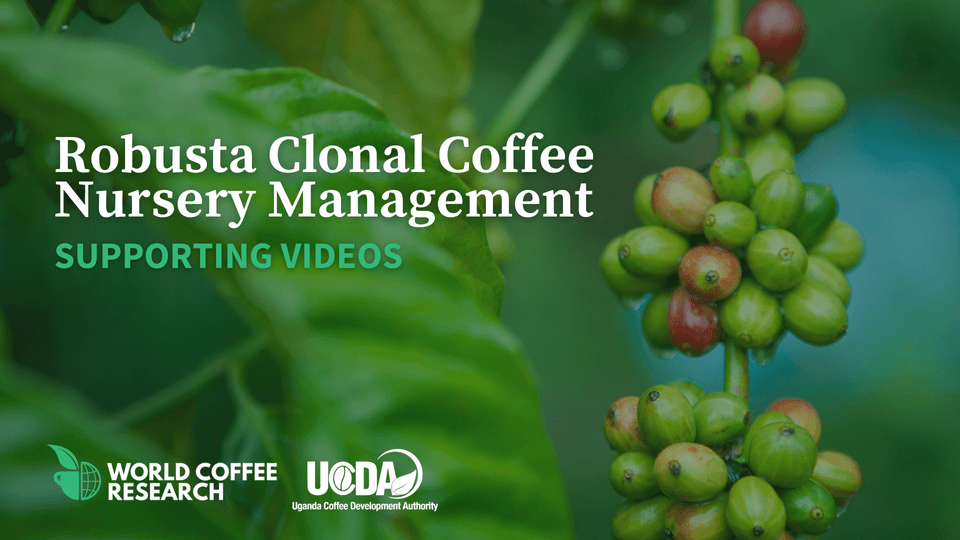
Robusta Clonal Coffee Nursery Management: Supporting Videos
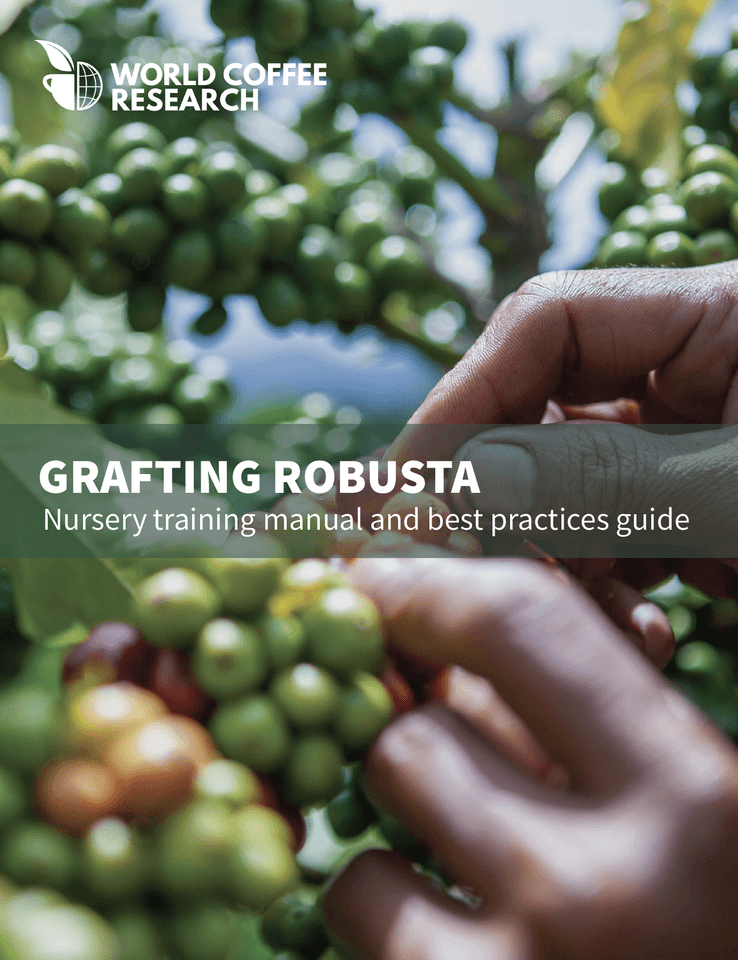
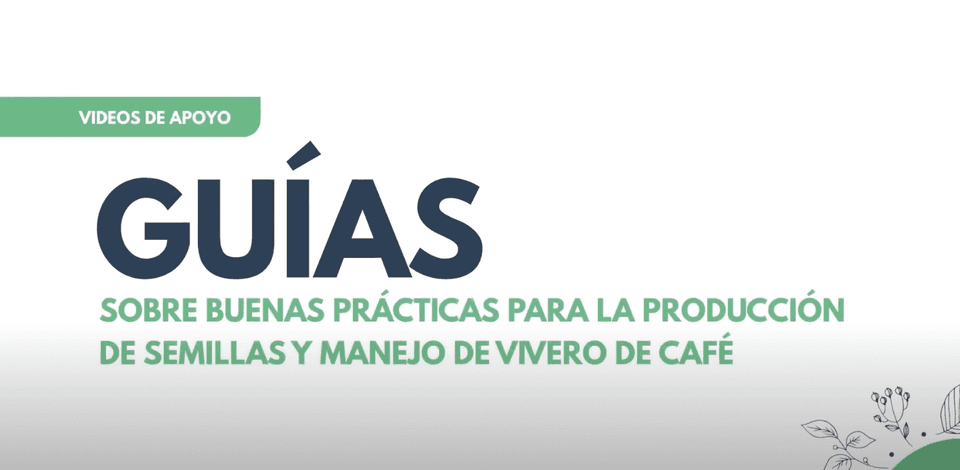
Entry 49452
Seed lot evaluation and clean-up aims to improve accessibility to genetically pure arabica seedlings
To create and enhance economic opportunity for coffee farmers, it’s critical to reduce barriers to accessing healthy coffee plants, which includes introducing traceability tools and best agricultural practices to improve the quality and genetic purity of available material. In 2022, with special funding support from member company Taylors of Harrogate, WCR commenced the clean-up of seven certified arabica seed lots across the Elgon, Rwenzori, and West Nile regions, which are three of the major arabica coffee-producing areas of Uganda.
This process entailed conducting a single nucleotide polymorphism (SNP) traceability analysis of samples from hundreds of trees to determine the genetic makeup of each seed lot’s existing plants. This analysis produced varying results in terms of genetic conformity but confirmed a high prevalence of purity among the SL14 variety—a high-yielding, drought and cold-tolerant variety—which will remain a focus as cleanup work progresses. In 2024, in collaboration with Taylors and Kawacom, WCR will complete the replacement of off-type trees, with the objective of distributing and planting pure seedlings at all seven seed lots by mid-2024.
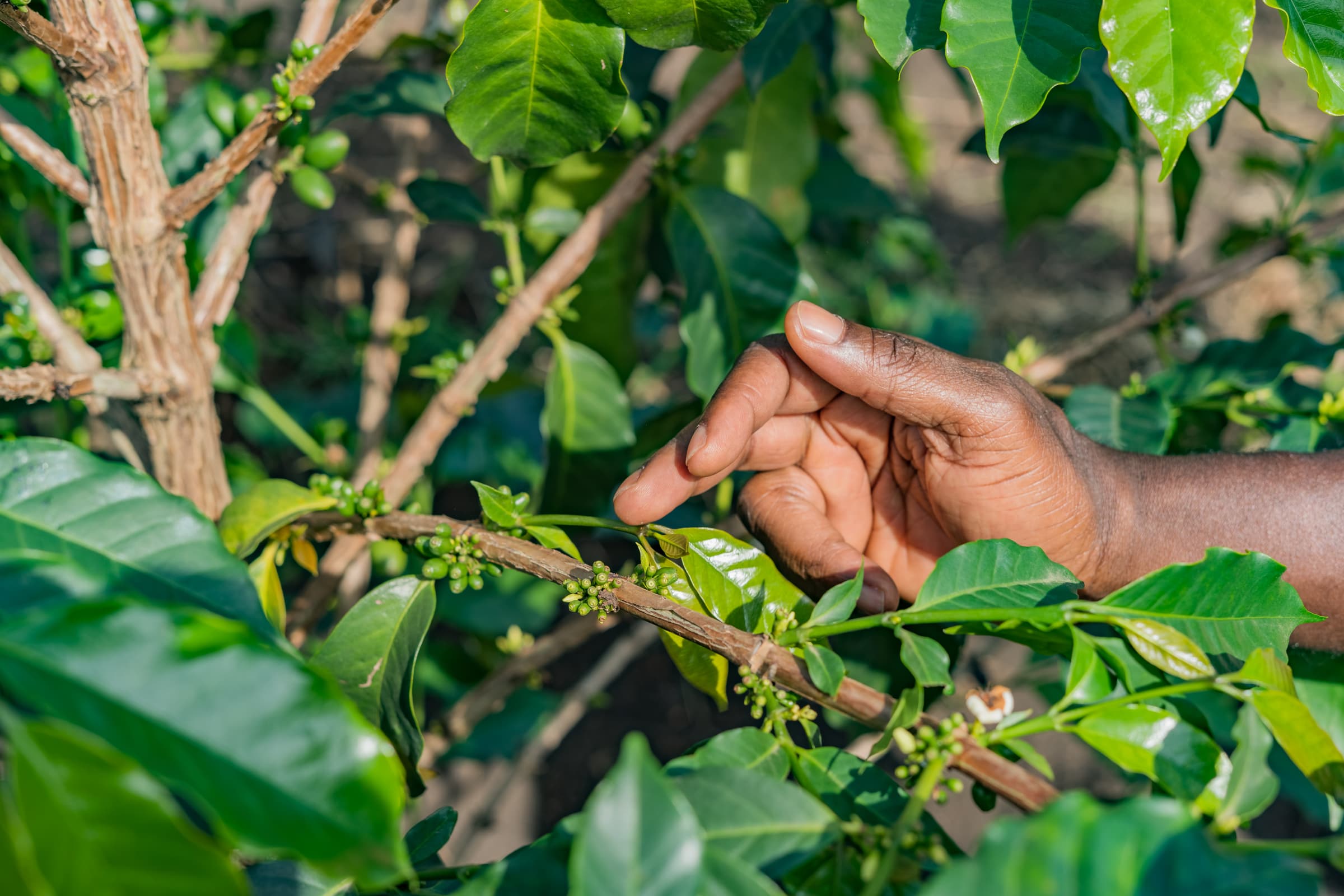
Taking measurements and inspecting plants in the field. Rwenzori region, Uganda.
In addition, to support the further development of nurseries in Uganda, WCR is working to increase access to localized training materials. In 2023, the organization translated its four-part video series supporting the Good Practice Guides for Coffee Seed Production and Nursery Management into Luganda and Lugisu, local languages that are commonly spoken in the aforementioned regions. These videos cover a variety of topics essential to nursery success, including varieties and genetics, substrates and containers, nutrition, and integrated pest management. In 2024, as this project concludes, WCR will conduct a training session for arabica nursery operators to reinforce knowledge of best practices for coffee agriculture and nursery management.
Unlocking the potential of coffee for the future of Ugandan farmers
Over the remainder of the decade, Uganda will continue to ramp up its comprehensive efforts to unlock the potential of coffee for the benefit of its farmers and economy. The country, with 14% of the world’s smallholder coffee farms, remains one of WCR’s most important focus countries, and the organization will continue to engage with local partners such as UCDA and NaCORI to support these endeavors to improve yield, increase productivity, boost export earnings, and solidify a bright future for the nation’s coffee sector.
“The ongoing WCR nursery initiatives in Uganda will contribute to the access of quality planting materials by farmers,” said Maureen Namugalu, WCR Uganda Country Project Manager, “In robusta regions, there is still limited and uneven distribution of the CWD-resistant KR lines, even as the disease remains a major threat to Uganda coffee farmers. It is exciting to see that over the past year, 50,000 plants have been raised under the WCR robusta nursery project and distributed for planting in the different coffee-growing regions.”
“I am also thrilled at the progress of our initiative to clean up Arabica seed lots,” continued Namugalu, “This will support seed lot operators to remove the off-type varieties and replace them with true-to-type varieties. We have already established a nursery with true-to-type plants and, in 2024, we shall be planting them in the respective Arabica seed lots.”